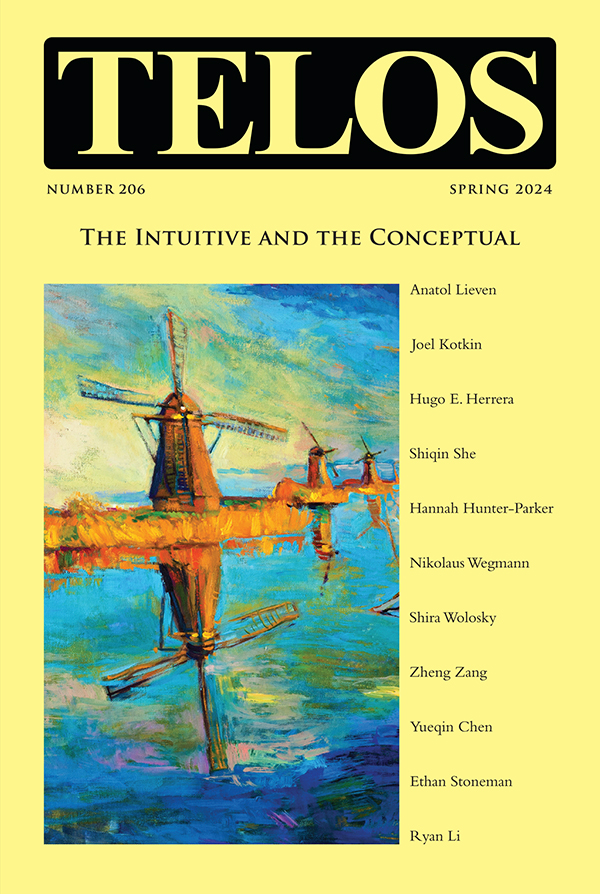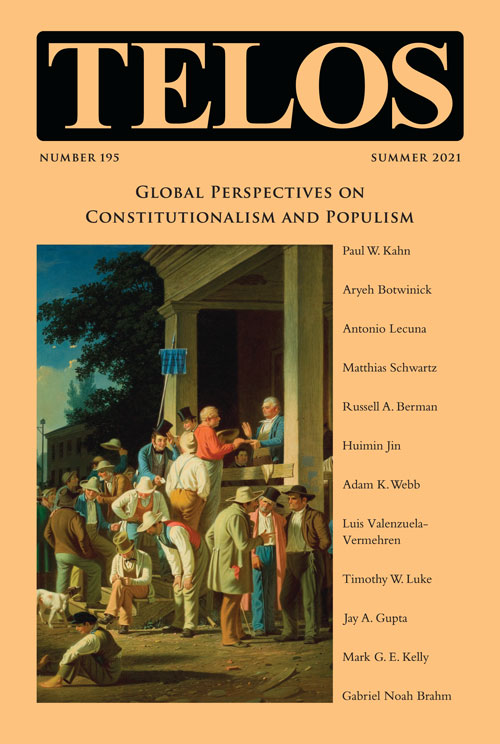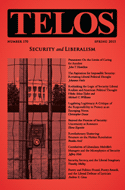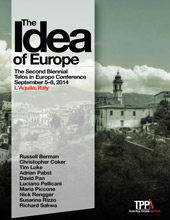By David Pan · Friday, April 5, 2024 Telos 206 (Spring 2024): The Intuitive and the Conceptual is now available for purchase in our store. Individual subscriptions to Telos are also available in both print and online formats.
 We often have the experience of intuiting something without being able to precisely define what that intuition is. Sometimes this intuition leads to a more well-defined insight, and sometimes it might lead to some kind of action, even in the absence of clear conceptual definitions. Yet it is difficult to ascertain what kind of knowledge or awareness such intuitions consist of. What is an intuition as opposed to a defined concept of something? How seriously should we take such intuitions? Are they something separate and qualitatively different than concepts? Are they just fuzzy concepts? Do they really exist at all? These are crucial questions because they lead to conclusions about the status of concepts themselves. If the alternative to clear concepts is nothing at all, then the sociopolitical corollary would be that the alternative to conceptual knowledge and the holders of such knowledge would also be nothing at all. By contrast, if intuitions are separate from concepts and real, then expert knowledge might possibly have some deficiencies in comparison with intuitions. The essays in this issue of Telos explore in one way or another this question of the status of conceptual knowledge as opposed to intuitive awareness. We often have the experience of intuiting something without being able to precisely define what that intuition is. Sometimes this intuition leads to a more well-defined insight, and sometimes it might lead to some kind of action, even in the absence of clear conceptual definitions. Yet it is difficult to ascertain what kind of knowledge or awareness such intuitions consist of. What is an intuition as opposed to a defined concept of something? How seriously should we take such intuitions? Are they something separate and qualitatively different than concepts? Are they just fuzzy concepts? Do they really exist at all? These are crucial questions because they lead to conclusions about the status of concepts themselves. If the alternative to clear concepts is nothing at all, then the sociopolitical corollary would be that the alternative to conceptual knowledge and the holders of such knowledge would also be nothing at all. By contrast, if intuitions are separate from concepts and real, then expert knowledge might possibly have some deficiencies in comparison with intuitions. The essays in this issue of Telos explore in one way or another this question of the status of conceptual knowledge as opposed to intuitive awareness.
Continue reading →
By Telos Press · Thursday, July 29, 2021 In today’s episode of the Telos Press Podcast, David Pan talks with Jay Gupta, Mark Kelly, and Tim Luke about the changing character of the public sphere. Their wide-ranging conversation covers a number of topics, including the ways that social media has fragmented the public sphere into separate echo chambers; how the internet has contributed to an insurgent populism around the world and the efforts by traditional stakeholders to shut it down; the atrophy of the value of truth and the dominance of “bullshit” in the Trump era; the extent to which moral earnestness preserves an aspiration to truthfulness; Trumpism and the critique of society as controlled by unaccountable New Class elites; the ongoing Trumpification of the Republican Party; and the conflation versus the interpenetration of elitism and expertise. Telos 195 (Summer 2021) features a forum on the public sphere with articles by Gupta, Kelly, and Luke, excerpts of which appear here. Read the full articles at the Telos Online website (subscription required). To learn how your university can subscribe to Telos, visit our library recommendation page. Print copies of Telos 195 are available for purchase in our online store.
Listen to the podcast here.
Continue reading →
By David Pan · Friday, June 18, 2021 Telos 195 (Summer 2021): Global Perspectives on Constitutionalism and Populism is now available for purchase in our store. Individual subscriptions to Telos are also available in both print and online formats.
 After watching the images of the January 6 Capitol riot, many Americans concluded that right-wing populism threatens the basic rules of our constitutional order. In this view, the U.S. Constitution establishes a universal order that is detached from any particular orientation and provides the neutral ground upon which differences can be discussed, while populists upset the rules of discussion and destroy the basis of a common project. Consequently, since populism is at odds with the Constitution, the solution would be to try to reimpose a measure of rationality upon the unruly. Yet the nagging concern behind this perspective is not just the violation of rules but the suspicion that populism is ultimately motivated by racism and sexism. In this case, the real opposition would not be between constitutionalism and populism but between two understandings of the Constitution, that is, two conceptions of the character of the people, one egalitarian and the other racist. The difficulty is that the laws of a constitution cannot exist independently of a people with a specific history. Rules cannot be neutral but imply a perspective on the world, and the conflict between constitutionalism and populism may in fact be a symptom of a conflict between two factions within the people, each of which is attempting to establish itself as the proper representation of the will of the people as a whole. After watching the images of the January 6 Capitol riot, many Americans concluded that right-wing populism threatens the basic rules of our constitutional order. In this view, the U.S. Constitution establishes a universal order that is detached from any particular orientation and provides the neutral ground upon which differences can be discussed, while populists upset the rules of discussion and destroy the basis of a common project. Consequently, since populism is at odds with the Constitution, the solution would be to try to reimpose a measure of rationality upon the unruly. Yet the nagging concern behind this perspective is not just the violation of rules but the suspicion that populism is ultimately motivated by racism and sexism. In this case, the real opposition would not be between constitutionalism and populism but between two understandings of the Constitution, that is, two conceptions of the character of the people, one egalitarian and the other racist. The difficulty is that the laws of a constitution cannot exist independently of a people with a specific history. Rules cannot be neutral but imply a perspective on the world, and the conflict between constitutionalism and populism may in fact be a symptom of a conflict between two factions within the people, each of which is attempting to establish itself as the proper representation of the will of the people as a whole.
Continue reading →
 When Edward Snowden, on June 9, 2013, revealed his identity in a video interview posted on the website of the Guardian, he invoked the intellectual framework of liberalism in order to explain why he had leaked a massive trove of secret documents about the spying and data collection practices of the National Security Administration (NSA) and its partner agencies. Having regularly witnessed the legal abuses of the NSA as a technical assistant for the CIA and, subsequently, as an employee of the defense contractor Booz Allen Hamilton, Snowden explained that “over time [the] awareness of wrongdoing builds up and you feel compelled to talk about it . . . until eventually you realize that these things need to be determined by the public, not by somebody who’s simply hired by the government.” When Edward Snowden, on June 9, 2013, revealed his identity in a video interview posted on the website of the Guardian, he invoked the intellectual framework of liberalism in order to explain why he had leaked a massive trove of secret documents about the spying and data collection practices of the National Security Administration (NSA) and its partner agencies. Having regularly witnessed the legal abuses of the NSA as a technical assistant for the CIA and, subsequently, as an employee of the defense contractor Booz Allen Hamilton, Snowden explained that “over time [the] awareness of wrongdoing builds up and you feel compelled to talk about it . . . until eventually you realize that these things need to be determined by the public, not by somebody who’s simply hired by the government.”
Continue reading →
By David Pan · Friday, October 10, 2014  I opened this conference by referring to the medical metaphor within which we have framed the question of democracy in order to point toward two paths for understanding this metaphor and to plead for the practice of both medicine and politics, not as mechanical sciences but as healing arts. In the following paper I would like to provide an example of the kind of artistic practice I have in mind by looking at two case histories of revolutionary movements from below, one success and one failure. What I would like to show in both cases is that the path to success lies in understanding the problem of democracy, first, as a problem of metaphor and thus of representation in the aesthetic sense and, second, as a problem that involves intervention in a developing metaphorical dynamic. I opened this conference by referring to the medical metaphor within which we have framed the question of democracy in order to point toward two paths for understanding this metaphor and to plead for the practice of both medicine and politics, not as mechanical sciences but as healing arts. In the following paper I would like to provide an example of the kind of artistic practice I have in mind by looking at two case histories of revolutionary movements from below, one success and one failure. What I would like to show in both cases is that the path to success lies in understanding the problem of democracy, first, as a problem of metaphor and thus of representation in the aesthetic sense and, second, as a problem that involves intervention in a developing metaphorical dynamic.
Continue reading →
By Herman Westerink · Monday, January 27, 2014 This is the last of three papers delivered at a seminar on religion and politics that was organized with Rowan Williams, the former archbishop of Canterbury, on the occasion of his recent book Faith in the Public Square. The seminar was held at Radboud University in December 2013. The first paper, by Martijn de Koning, appears here, and the second paper, by Chantal Bax, appears here.
It has been a real pleasure to read Rowan Williams’s book Faith in the Public Sphere, not the least because of one of the first statements in the introduction: “Archbishops grow resilient and sometimes even rebellious” in the face of all possible forms of critique archbishops can expect to receive when commenting public issues. A rebellious archbishop—what more can the reader wish? An archbishop willing to take the risk of “blundering into unforeseen complexities” when trying to find the connecting points between various public questions with religious faith. No blundering as far as I can tell, but a risk, yes, there is always a risk when talking about Faith in the Public Sphere, or having faith, being faithful, in the public sphere. This is not only a risky undertaking for an archbishop, but probably for every modern believer since the days of Ignatius and Calvin, who realizes that there is a tension between good civil behavior and raising one’s voice of conscience. Hence, that there is a fundamental tension between faith and the public sphere in modernity—a tension that cannot be resolved, but should actually be regarded to be constitutive and constructive for both faith and the public sphere itself. Having read the book, it seems to me that Williams has set himself the task of showing how constructive this tension can be.
Continue reading →
|
|
 We often have the experience of intuiting something without being able to precisely define what that intuition is. Sometimes this intuition leads to a more well-defined insight, and sometimes it might lead to some kind of action, even in the absence of clear conceptual definitions. Yet it is difficult to ascertain what kind of knowledge or awareness such intuitions consist of. What is an intuition as opposed to a defined concept of something? How seriously should we take such intuitions? Are they something separate and qualitatively different than concepts? Are they just fuzzy concepts? Do they really exist at all? These are crucial questions because they lead to conclusions about the status of concepts themselves. If the alternative to clear concepts is nothing at all, then the sociopolitical corollary would be that the alternative to conceptual knowledge and the holders of such knowledge would also be nothing at all. By contrast, if intuitions are separate from concepts and real, then expert knowledge might possibly have some deficiencies in comparison with intuitions. The essays in this issue of Telos explore in one way or another this question of the status of conceptual knowledge as opposed to intuitive awareness.
We often have the experience of intuiting something without being able to precisely define what that intuition is. Sometimes this intuition leads to a more well-defined insight, and sometimes it might lead to some kind of action, even in the absence of clear conceptual definitions. Yet it is difficult to ascertain what kind of knowledge or awareness such intuitions consist of. What is an intuition as opposed to a defined concept of something? How seriously should we take such intuitions? Are they something separate and qualitatively different than concepts? Are they just fuzzy concepts? Do they really exist at all? These are crucial questions because they lead to conclusions about the status of concepts themselves. If the alternative to clear concepts is nothing at all, then the sociopolitical corollary would be that the alternative to conceptual knowledge and the holders of such knowledge would also be nothing at all. By contrast, if intuitions are separate from concepts and real, then expert knowledge might possibly have some deficiencies in comparison with intuitions. The essays in this issue of Telos explore in one way or another this question of the status of conceptual knowledge as opposed to intuitive awareness. 
 When Edward Snowden, on June 9, 2013, revealed his identity in a video interview posted on the website of the Guardian, he invoked the intellectual framework of liberalism in order to explain why he had leaked a massive trove of secret documents about the spying and data collection practices of the National Security Administration (NSA) and its partner agencies. Having regularly witnessed the legal abuses of the NSA as a technical assistant for the CIA and, subsequently, as an employee of the defense contractor Booz Allen Hamilton, Snowden explained that “over time [the] awareness of wrongdoing builds up and you feel compelled to talk about it . . . until eventually you realize that these things need to be determined by the public, not by somebody who’s simply hired by the government.”
When Edward Snowden, on June 9, 2013, revealed his identity in a video interview posted on the website of the Guardian, he invoked the intellectual framework of liberalism in order to explain why he had leaked a massive trove of secret documents about the spying and data collection practices of the National Security Administration (NSA) and its partner agencies. Having regularly witnessed the legal abuses of the NSA as a technical assistant for the CIA and, subsequently, as an employee of the defense contractor Booz Allen Hamilton, Snowden explained that “over time [the] awareness of wrongdoing builds up and you feel compelled to talk about it . . . until eventually you realize that these things need to be determined by the public, not by somebody who’s simply hired by the government.”  I opened this conference by referring to the medical metaphor within which we have framed the question of democracy in order to point toward two paths for understanding this metaphor and to plead for the practice of both medicine and politics, not as mechanical sciences but as healing arts. In the following paper I would like to provide an example of the kind of artistic practice I have in mind by looking at two case histories of revolutionary movements from below, one success and one failure. What I would like to show in both cases is that the path to success lies in understanding the problem of democracy, first, as a problem of metaphor and thus of representation in the aesthetic sense and, second, as a problem that involves intervention in a developing metaphorical dynamic.
I opened this conference by referring to the medical metaphor within which we have framed the question of democracy in order to point toward two paths for understanding this metaphor and to plead for the practice of both medicine and politics, not as mechanical sciences but as healing arts. In the following paper I would like to provide an example of the kind of artistic practice I have in mind by looking at two case histories of revolutionary movements from below, one success and one failure. What I would like to show in both cases is that the path to success lies in understanding the problem of democracy, first, as a problem of metaphor and thus of representation in the aesthetic sense and, second, as a problem that involves intervention in a developing metaphorical dynamic. 

